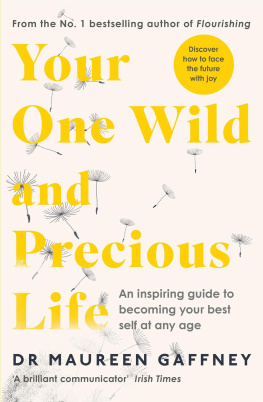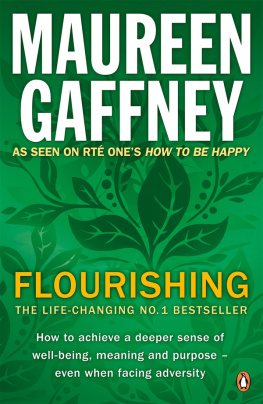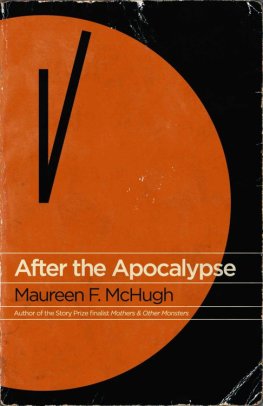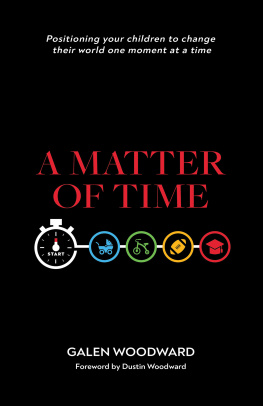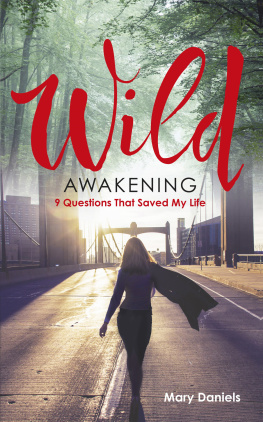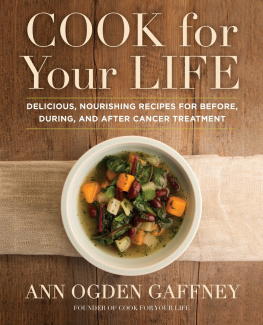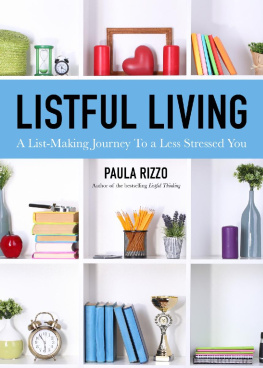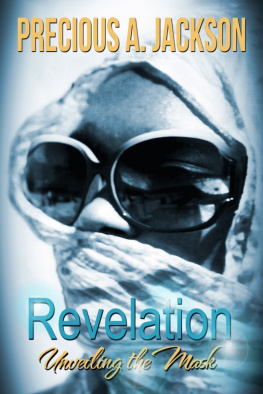Dr Maureen Gaffney
YOUR ONE WILD AND PRECIOUS LIFE
An Inspiring Guide to Becoming Your Best Self at Any Age

PENGUIN BOOKS
UK | USA | Canada | Ireland | Australia
New Zealand | India | South Africa
Penguin Books is part of the Penguin Random House group of companies whose addresses can be found at global.penguinrandomhouse.com.

First published by Penguin Life in 2021
Copyright Maureen Gaffney, 2021
Excerpt from Little Gidding from Four Quartets by T. S. Eliot. Copyright 1942 by T. S. Eliot, renewed 1970 by Esme Valerie Eliot. Reprinted by permission of Faber and Faber Ltd and of HarperCollins Publishers in the US.
may my heart always be open to little. Copyright, 1938 1966, 1991 by the Trustees for the E. E. Cummings Trust, from Complete Poems: 19041962 by E. E. Cummings, edited by George J. Firmage. Used by permission of Liveright Publishing Corporation.
The moral right of the author has been asserted
Cover design by Anna Morrison
ISBN: 978-0-241-98878-7
This ebook is copyright material and must not be copied, reproduced, transferred, distributed, leased, licensed or publicly performed or used in any way except as specifically permitted in writing by the publishers, as allowed under the terms and conditions under which it was purchased or as strictly permitted by applicable copyright law. Any unauthorized distribution or use of this text may be a direct infringement of the authors and publishers rights and those responsible may be liable in law accordingly.
To my husband John Harris and children
Elly and Jack Harris
We shall not cease from exploration
And the end of all our exploring
Will be to arrive where we started
And know the place for the first time.
T. S. Eliot, Four Quartets
Introduction: Living your one wild and precious life
How often do you think about your life and yourself? If youre like most people, you do it a lot. In fact, there is a special part of your brain devoted to doing just that. But whenever the external demands of your life let up, and your brain goes into a resting state, it primes you to start thinking about yourself and how you are living your life.
You think about what kind of person you are, and how you are the same as or different from other people. You reflect on what motivates you, what makes you happy or miserable, and if you are living the way you want to live. You think about how you have changed, or will change, as you go through the different stages of your life and what has stayed the same. This kind of self-reflection is usually brief, squeezed into whatever undisturbed time you can carve out for yourself, or maybe when you are on holiday.
But at certain times, and in certain circumstances, your interest in understanding your own psychology quickens and becomes more urgent. When your life has taken an unexpected turn. When you face an unexpected challenge or are trying to recover from a setback, like the break-up of an important relationship. When you reach a Big O birthday. When you reach midlife and naturally perform a stocktake of your life to date with a view to choosing how you want to live your lifes second half. And most especially when you enter, or imagine entering, a new stage of your life.
These times are potential crucial turning points, opening up a new opportunity to review, reassess and renew who you are and how you are living your life. They can motivate you to rethink your life, to make a new plan, or to change a situation that is holding you back from your full potential for happiness. And when you do that well, it will imbue your life with a new purpose and meaning.
This book will trace the arc of your psychological development as you proceed through the different life stages and describe the three basic and interconnected psychological drives that account for most of what you do in life the drive for closeness, the drive for autonomy and the drive for competence. It will describe how, from the moment of birth, you are wired to seek close personal relationships; how your desire for autonomy finds expression in your attempts to be your true self, and to control the direction and organization of your life; and how your drive for competence is played out in your efforts to manage your life effectively, and on your own terms.
Over the past fifty years, there has been a revolution in our understanding of human motivation, and how autonomy, closeness and competence play out in every stage of human development and determine our happiness and success in life. We now have a deeper understanding of how these three innate needs are intricately linked, and a clearer view of the central role autonomy plays in all this. The nature and importance of psychological autonomy is rarely discussed, because autonomy is often misrepresented as cool self-sufficiency. In fact, autonomy is the innate, driving human need to govern yourself, to be an active agent of your life, and to shape your destiny as best you can.
Do you ever long to break free in some area of your life? Buck at someone trying to manipulate and control what you think and do? Feel too fearful to match what you say and do with what is actually going on inside you? Do you ever feel that you have paid too high a price for love, acceptance, security or even peace in a relationship? When you feel like that, thats autonomy calling.
How often do you experience the surge of high energy, lift, forward movement that comes from knowing that you have taken your life in your hands? Or have that solid sense of being securely anchored in yourself when you face down fear and do what you know is hard but right? Thats autonomy in action. And who among us doesnt want to experience that kind of autonomy more often in our personal, work or public life especially if we know that we struggle more in one particular area of our life than others.
But if you dont identify those experiences as coming from losing or exercising autonomy, then you cant grasp their inner dynamics, and may not look in the right place for solutions. You wont be able to clearly identify what is carrying you forward in your life and development, or what is holding you back and blocking your momentum. In a completely new way, therefore, autonomy has become a premium competency.
At its most basic, the experience of autonomy is volition knowing that what you are doing is initiated inside you, not forced on you by external circumstances. Your actions are endorsed by your whole self heartfelt, fully owned by you, and you take responsibility for them. They come from the core of self, and you possess the inner freedom that allows you to act in a way that fits with that sense of self. There is a unity between how you think and feel inside, and what you say and do outside. Thats what being authentic, being true to yourself actually means what we used to call character. The opposite is the silencing of self that brings with it that deadening sense of hollowness and depression.
The opposite of autonomy is not dependence. It is feeling controlled. Feeling controlled runs counter to something deep in human nature. When you feel controlled by forces outside or within yourself, you are dissatisfied and unhappy, uneasy, anxious or resentful. Your functioning, your performance and your creativity in every domain of your life are undermined. If that sense of being controlled is chronic, you can become despairing of yourself and of your life.

